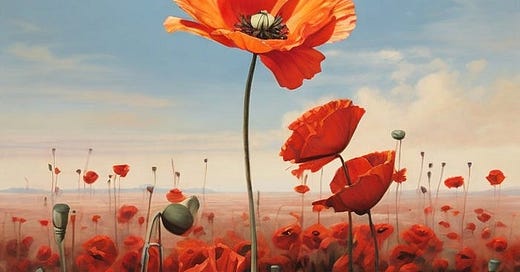An anticipation builds in the crowd as they eagerly await the appearance of their idol. The air is filled with a contagious excitement. He steps up to the microphone, and the crowd erupts in a cacophony of cheers, screams, and applause. The noise is overwhelming.
To be part of such a large and enthusiastic crowd fosters a sense of unity. Strangers become instant companions in the shared experience of this celebration. This collective passion creates a unique bond among everyone present.
The crowd’s energy is contagious, and each feel a rush of joy, excitement, or even a sense of awe. He becomes the focal point of everyone’s attention. The collective admiration and love from the audience can be overwhelming, and yet he waits in silence for the crowd to settle.
Another man stands in silence. This man stands not upon the stage but amongst the crowd. This man also stands apart, aloof, sceptical. His arms will remain folded across his chest whilst the crowd collectively raise a single arm in salute and in fealty to their idol. A photographer directs his camera to the adoring crowd, to capture this moment of dissent forever.
This man is August Landmesser. This is Germany, and it’s 1936.
To scan the crowd for Landmesser, we at first only see a mass of nameless humanity baying for blood. A field of wheat bending to the winds of war. Once the avalanche had begun, it was too late for these pebbles to vote.
But vote they had. Hitler was not elected by the majority, but his first few threads of power were legitimately seized. The rest were grasped with wild agitation, propaganda, riots, intimidation, the suspension of civil liberties and the arrest of political opponents.
Landmesser was at this rally because he was a member of the Nazi party, like so many around him. He had hoped that membership might help him to gain employment, as many must have at this time.
His tale is a tragic one. He faced repercussions from the Nazi Party due to his forbidden relationship with Irma Eckler, a Jewish woman. This led to his imprisonment and later forced enlistment into penal military service, resulting in his death in action.
Once you find Landmesser amongst this faceless throng, arms folded across his chest, a look of sceptical amusement on his face, it becomes difficult to see anyone else. The mob becomes even more indistinct. The crowd becomes separated from our modern, civilised perspectives, and Landmesser becomes one of us.
Landmesser is isolated and at odds with the crowd around him. In this singular act of defiance, Landmesser becomes an individual distinct from this crowd. From our vantage point so long after the fact, this minority voice is heard loud and clear.
Once I had identified Landmesser, he drew my eyes away from the lesson I might learn from this scene. Is it not the crowd itself who expose an important truth?
How many in this crowd would consider themselves educated, polite, moral and considerate? How many in this crowd believe that they would recognise and reject tyranny? How many would reject policies that bind us all in servitude to the collective will? How many would consider oppression as only imposed by other people?
To borrow from Thompson, like so many other generations how many in this crowd truly believe that they are part of something good? How many have the sense that whatever they are doing is right and that they are winning? How many feel a sense of inevitable victory? That their energy will simply prevail? That they have all the momentum and are riding the crest of a high and beautiful wave?
How many of us would recognise that if tyrannical policies did take hold, we may very well have voted for it and been glad?
Only from a vantage point so long after the fact, might we see the whole picture.
Everyone believes themselves the hero.
Perhaps we are the crowd.
The Refectory Of The Damned
It’s midnight. The only sound was the occasional clink of cutlery against white porcelain. I could only thank God that no soothing but anonymous music played over this scene. Silence was our salvation. We each ate immersed in this silence. Large round tables that could seat eight filled the hall from wall to wall. Bu…







